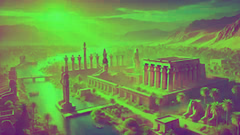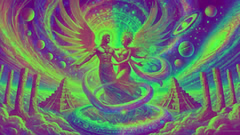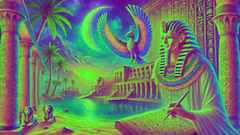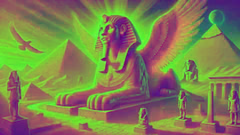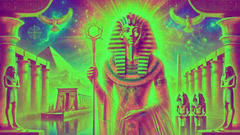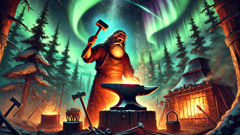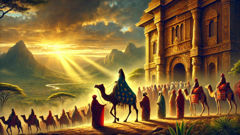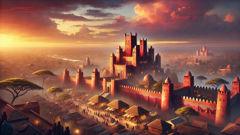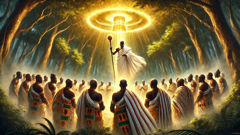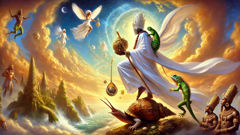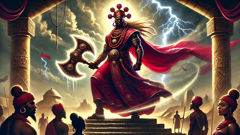Introduction
The river Nile’s ancient song drifted softly through the desert, and the world of gods and men shimmered beneath the Egyptian sun. In this timeless landscape, where papyrus marshes whispered secrets and the pyramids stood like sentinels of eternity, stories were more precious than gold. Among the most cherished was the tale of a high-ranking official—a scribe and overseer, respected in the court of Pharaoh—who set sail with a grand expedition in search of trade, fortune, and the favor of the gods. He was a man accustomed to luxury, to the careful calculation of risk, and to the ever-present protection of Ma’at, the goddess of order. Yet fate, capricious as the desert wind, had other plans. One fateful day, as their ship glided across the sapphire waters of the Red Sea, a sudden tempest rose with no warning. Lightning cracked like the wrath of Set himself. Great waves battered the vessel, splitting it asunder and tossing crew and cargo into the churning depths. When the storm’s fury subsided, the sun shone on a world transformed. Alone, clinging to a piece of wreckage, the official drifted to an island that shimmered with impossible colors—lush, green, and alive in ways he’d never seen. He was stranded, bereft of position, companions, or hope of rescue. Hunger gnawed at his belly and dread at his heart. But what he found on that enchanted island would challenge all he believed about power, humility, and wisdom. For this was no ordinary land. It was ruled by a creature out of legend—a serpent so vast and old that its eyes reflected the history of the world. The shipwrecked sailor’s journey on the serpent’s isle became a story that Egyptians passed from generation to generation: a testament to resilience, the unpredictable mercy of the gods, and the treasures that lie hidden where least expected.
I. The Shipwreck and the Awakening
The sailor’s name was Nebu, son of Harkhuf, esteemed scribe and overseer of merchants. His was a life shaped by discipline and ambition, but now the sea had stripped away his status and comforts. When he first opened his eyes, gritty sand clung to his skin, the sun blazed overhead, and the taste of salt still burned his lips. For a moment, he believed he’d crossed into Duat, the realm of the dead. But the sweet scent of foreign blossoms and the distant call of birds assured him he was very much alive.
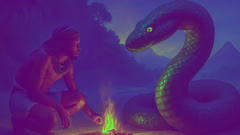
He staggered upright, taking in his surroundings. The beach was unlike anything he had seen along Egypt’s shores. Clusters of palm trees swayed above, their fronds heavy with golden dates. Flowers—some familiar, some alien—grew in wild profusion: blue lotus, fiery hibiscus, white star-shaped blooms that glittered as if dusted with crushed turquoise. A gentle breeze carried the chirping of unseen creatures and the soft rush of waves. Though exhausted, Nebu’s training asserted itself. He took stock: one battered cloak, a dagger still lashed to his thigh, a pouch of amulets, and a heart heavy with despair.
He remembered the storm—the sky turning dark as ink, the thunder that shook his bones, the frantic shouts of his men. Nebu had tried to command order, but nature’s fury cared nothing for rank. The last thing he saw was a mast crashing down and water swallowing him whole. Now he was alone, and silence pressed in on all sides.
Determined not to succumb to fear, Nebu set about exploring the island. He found a stream of crystalline water, cool and sweet, flowing from the heart of the jungle. Mangoes, figs, and dates hung ripe from low branches, and a nearby spring teemed with fish. Survival, at least for now, was possible.
Yet the sailor could not shake the sense that the island was watching him. Shadows moved in the trees. The birdsong sometimes shifted into strange, echoing notes that sent chills down his spine. At night, Nebu built a fire of driftwood and reeds. Its flickering light cast giant shapes on the trunks around him—shapes that seemed, at times, almost serpentine.
He counted the days by scratching marks onto a smooth rock near the water’s edge. Each morning he searched for signs of rescue, but none came. He called out to passing seabirds, hoping they’d carry word to the world beyond. But the birds only watched him with golden, knowing eyes.
One evening, as the sun melted into a violet horizon, Nebu sat by his fire, hunger and longing gnawing at him. That’s when the ground trembled. First, it was a subtle shiver, then a rolling quake. The trees swayed. Out of the shadows slid a colossal shape—scales gleaming like polished malachite, eyes bright as lapis, tongue flicking out like a crimson banner. A serpent, longer than ten men, coiled itself in the firelight.
Nebu froze. His heart thundered in his chest. Every tale he’d ever heard about monsters and spirits rose up. The serpent regarded him with an unsettling intelligence, its head swaying hypnotically.
“Fear not, mortal,” it spoke in a voice that seemed to echo from the earth itself. “This is my island. I have watched you since you came. You are not the first to be cast here, nor will you be the last.”
A shudder ran through Nebu. “Great one, I am but a servant of Pharaoh. I wish no harm. I have lost everything. Spare me.”
The serpent studied him for a long moment. “All who come here are stripped of what they think matters. Only those who listen and learn may leave. Rest, Nebu. Tomorrow, you will walk with me, and perhaps you will understand why the gods have sent you.”
That night, Nebu hardly slept, torn between terror and a strange hope. In the morning, as the sun gilded the treetops, the serpent waited for him at the jungle’s edge. Thus began Nebu’s true journey—a journey into wisdom, humility, and the heart of mystery.
II. Wisdom of the Serpent: Lessons on the Island
The serpent led Nebu deep into the island’s heart, where ancient trees arched overhead like the pillars of a forgotten temple. Sunlight filtered through the leaves in shifting patterns, painting the ground with gold and green. The serpent’s presence was at once awe-inspiring and unsettling; its movement was silent, fluid, almost regal. Nebu followed, clutching his amulet and whispering prayers to Thoth for courage.
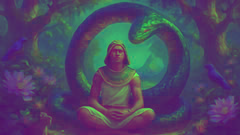
They came upon a grove where the air shimmered with birdsong and the fragrance of jasmine. The serpent paused and regarded Nebu. “You fear me,” it said, “as all mortals fear what they cannot control. But fear is the gate to wisdom if you pass through it.”
Nebu bowed his head. “I am afraid, great one. I have lost my ship, my men, and my place in the world. What can I learn here?”
The serpent coiled itself in the grass, forming a circle that glinted in the dappled light. “You humans build monuments of stone and hieroglyphs to defy time. Yet all crumble. On this island, nothing is permanent but change itself. You must learn to accept what you cannot command.”
They spent days together. The serpent taught Nebu how to find food in places he’d never look: sweet tubers hidden beneath earth, honey concealed in hollow trees guarded by brilliant blue bees, water collected in the petals of giant lilies. It showed him how to listen to the wind for signs of coming storms and how to recognize the tracks of unseen animals. Nebu learned to watch, to wait, to let go of impatience. The serpent spoke of the cycles of life—birth, death, and renewal—and of the balance that Ma’at demands from all creatures.
One afternoon, as they rested by a pool reflecting the sky, Nebu asked, “Why do you remain here, mighty serpent? Why this island?”
The serpent’s gaze grew distant. “Long ago, I was guardian of Pharaohs. I saw dynasties rise and fall. But pride consumed me, as it does many. When I defied Ma’at, the gods exiled me here. Now I serve as teacher to those who are cast upon these shores by fate. Each learns what he needs—if he listens.”
Nebu felt humility for the first time in his life. He confessed his own pride, his longing for glory and recognition at court. The serpent listened without judgment.
“True wisdom,” the serpent said softly, “is knowing that all power is borrowed, not owned. The river carves its path, but the desert endures. Find your balance. Accept what you cannot change. Then you will be free.”
As days passed, Nebu’s fear faded. He began to see the island’s wonders: orchids that bloomed only by moonlight, birds with feathers like polished silver, butterflies bigger than his hand. The serpent recited ancient riddles and stories of forgotten Pharaohs, testing Nebu’s wit and patience. Sometimes Nebu failed, but the serpent only smiled and urged him to try again.
One night, beneath a tapestry of stars, Nebu lay awake listening to the distant crash of waves. He realized he had come to love this place—the peace, the beauty, even the solitude. He no longer yearned for power or status. Instead, he felt gratitude: for survival, for lessons hard-won, for the companionship of an unlikely friend.
But change was coming. On the thirtieth day, the serpent grew restless. Its scales shimmered in the starlight, and its eyes seemed sad.
“Your time here is ending,” it said. “You have learned what you needed, Nebu. Tomorrow, you will find a boat on the northern shore. It will carry you back to Egypt. But remember this: the greatest treasures are not gold or fame, but wisdom and humility.”
Nebu bowed deeply. “I will never forget you, great serpent.”
The serpent uncoiled, brushing Nebu’s hand with its head—a gesture of farewell and blessing. That night, Nebu dreamed of vast deserts and rivers of light, and of a world where gods and mortals learned from one another.
III. Return to Egypt: A Changed Heart
At dawn, Nebu rose and made his way to the northern shore. As promised, there waited a small but sturdy boat carved from strange wood, its sail embroidered with a symbol he recognized from the serpent’s scales. The air was heavy with the scent of frangipani and salt. Nebu looked back toward the jungle, hoping for one last glimpse of his teacher. For a heartbeat, he saw the serpent coiled on a distant hill, watching him go.
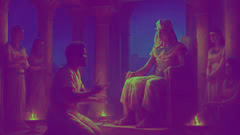
The journey home was swift. The winds favored Nebu’s sail, and no storm dared threaten him. He saw dolphins leap beside his boat and seabirds fly in formation overhead, as if guiding him. Within three days, the familiar shoreline of Egypt emerged from the morning mist—the pale stones of temples, the soft green of reeds, and beyond them, the life-giving ribbon of the Nile.
Nebu’s arrival caused a stir. Ragged, sun-browned, and quiet where once he was proud, he was barely recognized by the palace guards. Word soon spread that the lost overseer had returned from the dead. Pharaoh himself summoned Nebu for an audience. In the great hall, gilded pillars rose like papyrus stalks toward a ceiling painted with stars. Nobles in linen finery gossiped in huddles; priests cast furtive glances.
Nebu knelt before Pharaoh and told his story—of the storm, the island, and above all, the wise serpent who had changed his heart. At first, the courtiers scoffed; some whispered that Nebu was mad or cursed. But Pharaoh saw something new in Nebu’s eyes: a serenity untouched by courtly intrigue.
Pharaoh asked, “What did you learn on this island that is greater than gold?”
Nebu replied, “I learned that wisdom is found in listening and in letting go of pride. That true strength is not in commanding others, but in accepting one’s place in Ma’at’s design. And that the humblest creature may be the greatest teacher.”
Pharaoh pondered these words. “Then you are richer than any who serve me. I restore your rank, but your counsel shall be even more valuable.”
Nebu was welcomed back with celebration, but he never returned to his old ways. He lived simply, teaching others not only the skills of trade and administration but also the quiet virtues of patience and humility. He placed a carved serpent on his table as a reminder of the friend who had shown him the path to wisdom.
Years passed. Nebu’s story spread throughout Egypt—told by scribes, sung by poets, painted in hidden corners of tombs. Children dreamed of magical islands and wise serpents; priests debated the deeper meanings. But Nebu himself always said that the greatest gift was not survival, nor even the favor of Pharaoh, but the understanding that every hardship conceals a lesson, and every ending is a new beginning.
And so, long after Nebu’s name faded from official records, the tale of the shipwrecked sailor endured: a story not just of peril and rescue, but of transformation—and of the secret treasures hidden on islands both real and imagined.
Conclusion
The tale of Nebu, the shipwrecked sailor, echoes through time as a beacon for all who find themselves adrift—whether in foreign lands or in the uncertain tides of life itself. His journey began with disaster and fear, but it led him to a magical island where survival depended not on strength or cunning alone, but on openness to learning and acceptance of fate’s mysteries. The serpent, once a figure of terror, became Nebu’s greatest teacher: a symbol of transformation, humility, and the deep wisdom hidden within all things. Nebu’s return to Egypt did not restore him to his old life; instead, it elevated him to a new understanding that shaped those around him for generations. Even now, in the shadows of Egypt’s ancient monuments and the whispers of the wind over its deserts, the story lives on—reminding us that true treasure lies not in wealth or power, but in courage, wisdom, and the friendships we make along the way.


